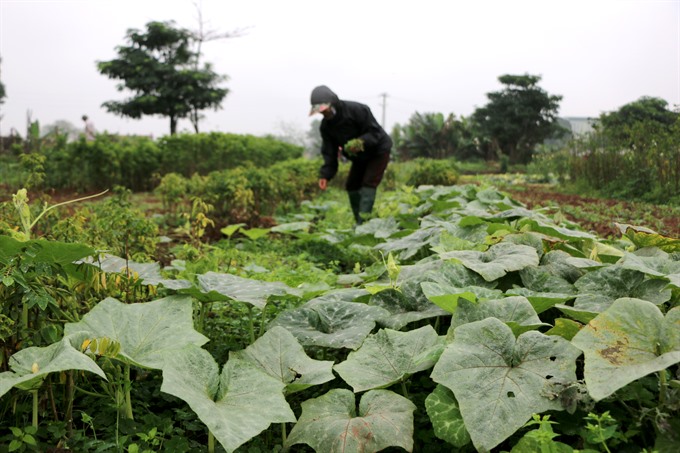 Society
Society

Cultivation sector of Hà Nội has faced a lot of challenges due to climate changes and narrowed agricultural land.
 |
| A farmer works on her garden in Thường Tín District, Hà Nội. VNS Photo Doan Tung |
HÀ NỘI — Hà Nội’s agricultural sector has faced many challenges due to climate changes and a reduction in agricultural land.
In Chương Mỹ District’s Nam Phương Tiến Commune, about 20 ha of vegetables have been planted this season, but prolonged torrential rains and hot weather recently severely damaged the vegetables, said chairman of the commune People’s Committee Nguyễn Chiến Thắng.
Đặng Hữu Hùng, a local farmer, said he was worried about his pomelo garden after the historically hot weather hit the city in June, the time his pomelo trees were about to blossom.
He said he was deeply concerned about his pomelo crop this year.
In Đan Phượng District’s Hạ Mỗ Commune, dozens of ha of flowers were also affected by hot weather and prolonged torrential rains, Hà Nội Mới (New Hà Nội) newspaper reported.
Nguyễn Đăng Tiến, a lily grower said he earned hundreds of millions of đồng from his lily field in previous years. But this year, there was no profit.
Head of Cultivation Office under the Hà Nội’s Agriculture and Rural Development Nguyễn Thị Thoa said besides the weather, the city’s cultivation sector also suffered from a reduction in agricultural land due to rapid urbanisation.
Data from the department found that there 2,550 ha of agricultural land in the city was lost since this spring crop season due to urbanisation, she added.
Solutions
Minister of Agriculture and Rural Development Nguyễn Xuân Cường, said local agencies should closely watch weather forecasts to issue warnings to local farmers about the right time to plant.
This would help minimise damages on crops caused by weather, he said.
For example, farmers should be advised to plant their flowers every 5-7 days instead of planting them all at the same time. This method will protect them from losing all their flowers due to bad weather, he said.
Additionally, the local agricultural sector was told to carefully select rice seedlings for higher productivity in the context of urbanisation reducing farm land, he said.
Hà Nội should use hi-tech technology to develop its agricultural sector, he said.
Agreeing with Cường, Đỗ Đức Trung, vice chairman of the People’s Committee of Hoài Đức District said hi-tech agriculture was believed to be the best choice to help farmers adapt to climate change.
The district applies hi-tech to 55ha of vegetables in Tiền Yên Commune. It has also encouraged local farmers to apply hi-tech in growing Canh oranges and Diễn pomelos in the future, he said.
Statistics from the agricultural department showed that the city has run 38 hi-tech agriculture models. Thanks to the models, famers could earn between VNĐ400 million (US$17,600) and billions of đồng per ha each harvest season.
Chu Phú Mỹ, head of the city’s agriculture and rural development department said constructing large-scale hi-tech agricultural areas was another solution to fix the situation the city administration should consider. — VNS




